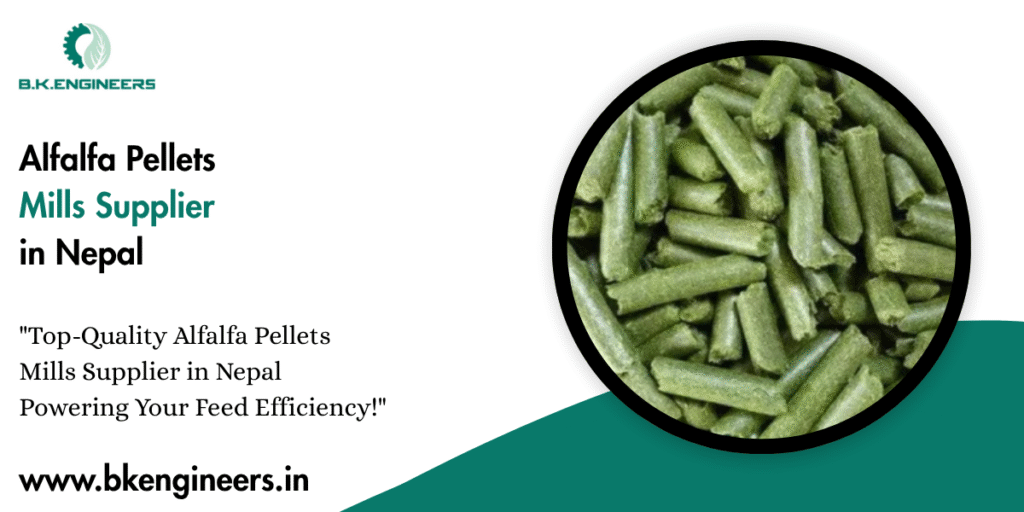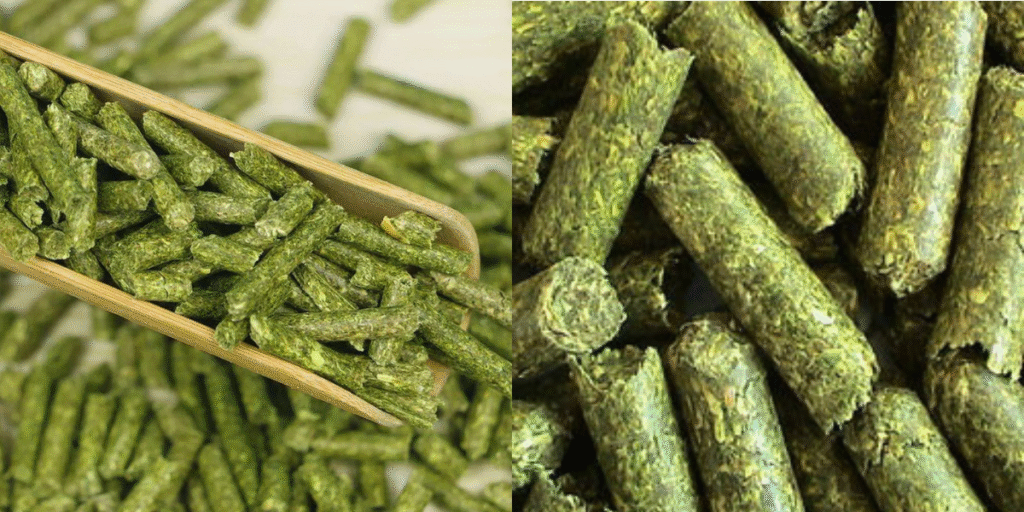Alfalfa Pellets Mills Supplier in Nepal

Introduction
At B.K. Engineers, we specialize in manufacturing a wide range of mills designed to meet your diverse needs. Our expertise spans across Cattle Feed Mills, Poultry Feed Mills, Aquatic Feed Mills, Bran Pelleting Mills, Hull Pelleting Mills, Grass Pelleting Mills, Alfalfa Pellets Mills, Wood Pellets Mills, and Straw Pelleting Mills. With our state-of-the-art technology and commitment to quality, we ensure that you get the best equipment for your production needs.
The livestock and poultry sector in Nepal is expanding quickly, and farmers are searching more and more for premium feed options to boost output and animal health. Alfalfa pellets are among the best methods for supplying wholesome feed. These pellets are perfect for dairy, poultry, and livestock because they are high in protein, vitamins, and minerals.B.K. Engineers is a trustworthy partner if you’re looking for an Alfalfa Pellets Mills Supplier in Nepal. With years of experience and a track record of producing high-quality equipment, we offer solutions that maximize productivity and profitability for farmers and feed producers. We are the best Alfalfa Pellets Mills Manufacturer.
Why Are Alfalfa Pellets
Many people are aware of alfalfa’s excellent nutritional value. It is high in protein, calcium, and other vital elements that help animals like cows, goats, sheep, and fowl grow healthily, produce milk, and generally be happy. Although raw alfalfa has several advantages, its bulk and moisture content make it difficult to store and transport. Alfalfa pellet mills are the ideal answer in this situation. Alfalfa is compressed in these mills into compact, dense pellets that are convenient to transport, store, and feed to animals. We are the best Alfalfa Pellets Mills Provider.
Why Choose B.K. Engineers
- Unmatched Machine Quality and Durability: A pellet mill operates under extreme stress. Inferior machines use low-grade metals for the critical “die and roller” assembly, which wear out quickly. This leads to frequent downtime and high replacement costs. A reputable supplier ensures the machinery is built to last, using hardened alloys that withstand the test of time and continuous operation.
- Consistent Technical Support and Spare Parts: What happens when a crucial part breaks down? If your supplier is just a trader with no technical expertise or spare parts inventory, your entire production halts for days or even weeks. This lost time is lost money. A true partner has a ready stock of genuine spare parts and a team of technicians to get you back up and running swiftly.
- Professional Guidance and After-Sales Service: Setting up a pellet plant involves more than just the mill. You need guidance on the entire process: drying, grinding, conditioning, and cooling. A reliable supplier doesn’t just sell you a machine and walk away. They provide the technical know-how, help you troubleshoot operational issues, and ensure you are getting the most out of your investment.
- Trusted Technical Expertise: Our staff is made up of certified engineers and technicians with extensive feed mill technology experience. We can address any questions you may have regarding capacity planning, moisture content, or the proper die size for alfalfa. We give you the technical information and assistance you need to make wise choices.
- Strengthening Local Economies: You are supporting the national economy by working with B.K. Engineers. By allowing you to produce high-quality feed locally and lowering imports, we help build a self-reliant Nepal, support local supply chains, and create jobs locally.
- Experience and Expertise: B.K. Engineers was founded in and has over of experience as a leader in the industry. Because of our vast experience, we are able to provide you equipment that is not only efficient but also precisely tailored to your unique requirements. We also have a thorough understanding of the subtleties involved in feed processing. To make our products better, our team of highly skilled experts is always researching and coming up with new ideas.
- Sturdy and Long-Lasting Design: Our equipment is made to last. Throughout the manufacturing process, we employ premium materials and strict quality control procedures. Our equipment can endure the demands of continuous operation because to our dedication to quality, giving you years of dependable service and a significant return on your investment.
- Energy Efficiency: It can take a lot of Alfalfa Pellets Mills a feed mill. Energy-efficient machine designs are a top priority for BK Engineers, which will save operating costs and help create a more sustainable future.
- Comprehensive After-Sales Support: After the sale, our partnership with you continues. We offer comprehensive post-purchase assistance, encompassing installation, commissioning, operator education, and easily accessible replacement parts. Our committed support staff is available at all times to make sure your business functions properly, reducing downtime and increasing output.

Applications of Alfalfa Pellet Mills
1. Livestock Feed Production
- Dairy farms, poultry farms, and goat farms use alfalfa pellets to provide high-protein feed. Consistent and nutritionally rich pellets lead to better milk yield, healthier livestock, and faster growth.
2. Commercial Feed Manufacturing
- Feed manufacturers use pellet mills to produce high-volume, high-quality feed pellets for sale. Alfalfa pellets are a popular product in the commercial feed market due to their high demand and nutritional value.
3. Agricultural Waste Management
- Alfalfa pellet mills can also process crop residues like straw, grass, and corn stalks into useful pellets. This reduces agricultural waste and creates an additional income stream for farmers.
4. Organic Fertilizer Production
- Some advanced pellet mills can also be used for processing organic materials into nutrient-rich pellets that can be applied as fertilizers. This makes pellet mills versatile tools in sustainable farming practices.
5. Goat and Sheep Feed
- For goats and sheep, alfalfa pellets provide essential nutrients in a form that is easy to digest. This improves growth rates and reproductive performance, which is particularly important for meat and milk production.
6. Poultry Feed
- Although poultry feed is typically grain-based, adding alfalfa pellets boosts protein content and enhances the birds’ overall nutrition. This leads to better egg quality and healthier poultry.
7. Feed Mills and Commercial Producers
- Feed manufacturers often use alfalfa pellets as an ingredient in mixed feed formulations. The uniform size and high nutrition of the pellets simplify feed processing and improve product consistency.
Specification Table of Alfalfa Pellet Mill
| Feature | Specification |
|---|---|
| Material | Alfalfa Pellet Mill |
| Pellet Diameter | 2–8 mm (adjustable) |
| Motor Power | 7.5–22 kW |
| Production Capacity | 200–1000 kg/hour |
| Material Compatibility | Alfalfa, grass, hay, crop residues |
| Motor Type | Three-phase, AC motor |
| Machine Body | High-quality steel, corrosion-resistant |
| Power Supply | 380V / 50Hz (customizable) |
| Noise Level | ≤75 dB |
| Maintenance | Easy access to wear parts |
| Warranty | 12 months |
Advantage of Alfalfa Pellet Mill
- Robust and Reliable Machinery: Nepali farming can be tough, and your machinery needs to be tougher. Our pellet mills are engineered for durability and high performance. They are built to handle continuous operation, ensuring your production line never stops unexpectedly.
- Customized Solutions for Your Scale: Are you a small-scale farmer looking to produce for your own use? Or a large entrepreneur aiming to supply the entire district B.K. Engineers offers a range of models. We help you choose the perfect mill capacity that matches your business goals and budget, ensuring you don’t over-invest or under-invest.
- Proficiency in Whole Processing Lines: Pellet production involves more than simply the mill. Chaffing, drying, cooling, and packaging are all part of it. B.K. Engineers is your one-stop shop for establishing a complete pellet mill since we offer comprehensive advice and are able to supply the full integrated processing line.
- Encouraging Local Agriculture: By working with us, you are helping a Nepali business in your community. We have a stake in the agricultural prosperity of our country. We are dedicated to enabling local company owners to create prosperous and long-lasting enterprises since your success is our success.
- Massive Boost in Milk Production: For dairy farmers, this is the key to higher profits. The high protein and digestible fiber in alfalfa pellets directly translate to increased milk yield and improved butterfat content. Healthy, well-fed cows simply produce more and better milk.
- Superior Animal Health: Alfalfa is rich in calcium, phosphorus, and vitamins and This leads to stronger bones, better immunity, shinier coats, and overall improved animal health. It also aids in proper digestion, reducing bloating and other stomach issues.
- Convenience and Ease of Storage: Storing a truckload of hay requires a huge shed and is prone to rotting and pests. A ton of alfalfa pellets, on the other hand, can be stacked neatly in a small corner of a room. They are easy to transport, measure, and feed.
- Reduced Waste: When animals eat loose hay, they are picky and often waste a lot by trampling it. With pellets, there is almost no waste. Every bite is consumed, making your feed budget go much further.
- Economic Empowerment: By growing alfalfa yourself and pelletizing it, you create your own sustainable feed source, cutting dependence on expensive, imported feed. You can even turn it into a business by selling pellets to other farmers.
- Pelletizing: The conditioned alfalfa meal is then forced through a metal die a thick disk with many small holes. Under immense pressure from rollers, the meal is squeezed through these holes, emerging on the other side as long, solid strands.
- Cutting and Cooling: A rotating knife cuts these strands into uniform pellet lengths. The pellets are then cooled and hardened to make them durable for storage and transport.
Types of Alfalfa Pellets Mills
1. Flat Die Pellet Mill
- Flat die pellet mills are compact, versatile, and ideal for small to medium-scale operations. The pellets are formed as alfalfa powder passes through a flat die with multiple holes under high pressure.
2. Ring Die Pellet Mills
- Ring die pellet mills are designed for large-scale pellet production. They are more efficient than flat die mills and can handle high volumes of raw material. Features include.
3. Small Mini Pellet Mills
- For individual farmers or small-scale production, mini pellet mills are a great option. They are lightweight, easy to operate, and affordable. Key points include.
4. Large Industrial Pellet Mills
- For large industrial feed production, large industrial pellet mills are the best option. B.K. Engineers provides high-capacity machines suitable for big factories. Features include.
5. Biomass Pellet Mills
- Some alfalfa pellet mills can also process other biomass materials such as straw, corn stalks, and grass. This flexibility allows farmers and feed producers to diversify their feed production.
Conclusion
In Nepal, alfalfa pellets are essential for raising farm output and cattle nutrition. Purchasing a top-notch alfalfa pellet mill is a wise move for any farmer or feed producer. B.K. Engineers, a top supplier of Alfalfa pellet mills in Nepal, provides robust, effective, and adaptable pellet mills that satisfy the particular requirements of Nepalese farmers. We are the Best Alfalfa Pellets Mills Supplier.
B.K. Engineers is the best option for anyone looking for a trustworthy supplier of Alfalfa Pellets Mills in Nepal. With premium equipment, adaptable solutions, first-rate post-purchase assistance, and affordable prices, they enable farmers and feed manufacturers to successfully make wholesome and economical alfalfa pellets. Purchasing a pellet mill from B.K. Engineers ensures long-term success for your farming or feed business in Nepal by increasing animal output and improving feed quality.

